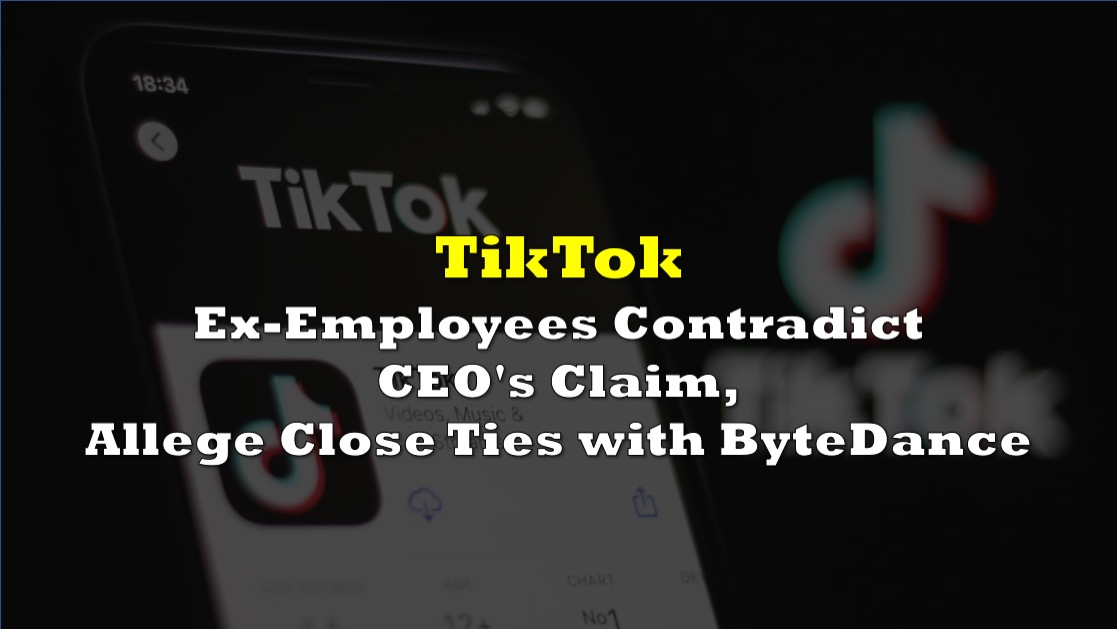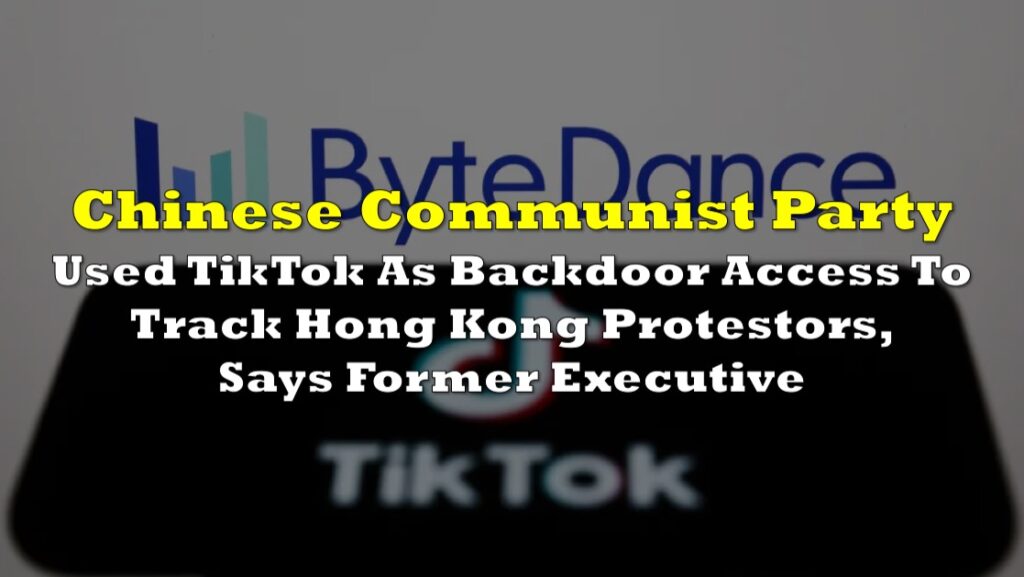Former employees of TikTok have come forward with allegations that challenge the company’s assertions of independence from its Chinese parent company, ByteDance. These claims cast doubt on TikTok’s efforts to distance itself from Beijing amid concerns over national security risks.
According to interviews conducted by Fortune with 11 ex-workers, including four who were employed as recently as last year, TikTok’s operations were allegedly intertwined with ByteDance during their tenures. These individuals, some speaking anonymously due to fear of retaliation, contend that the company’s purported autonomy from China was largely cosmetic.
SCOOP: A TikTok data scientist says he was assigned a Seattle-based manager on paper, while actually reporting to a Beijing-based ByteDance executive, who ordered him to regularly email U.S. data in spreadsheets to ByteDance workers in China during 2022. https://t.co/4eDzYR9jxR
— Alexandra Sternlicht (@iamsternlicht) April 15, 2024
One former senior data scientist, Evan Turner, revealed that despite TikTok’s announcement of storing U.S. user data solely within the country, he continued to collaborate with ByteDance executives in Beijing. Turner described a concealed chain of command where he reported to a U.S.-based manager on paper but communicated primarily with a ByteDance executive in China, sending sensitive user data across international borders.
“I literally worked on a project that gave U.S. data to China,” Turner said. “They were completely complicit in that. There were Americans that were working in upper management that were completely complicit in this.”
Turner’s account raises concerns about the efficacy of TikTok’s initiatives to address regulatory scrutiny, such as Project Texas, launched in response to attempts by the Trump administration to ban the app. Despite measures to localize data storage and enhance security, allegations of data sharing persist, fueling calls for stricter oversight.
The House of Representatives voted overwhelmingly in March to compel ByteDance to divest its stake in TikTok, reflecting bipartisan apprehension about the platform’s ties to China. While President Joe Biden signaled support for such measures, the Senate’s response remains pending.
Cybersecurity experts offer divergent views on the implications of TikTok’s alleged data practices. Anton Dahbura of Johns Hopkins warns of the potential risks associated with transferring even small amounts of user data to China, citing concerns about targeted attacks.
“Even though a spreadsheet is probably a very tiny percentage of all of the information that TikTok collects, it can be extremely targeted and very damaging to certain people,” he noted.
In contrast, Jon Lindsay of Georgia Tech suggests that such incidents may stem from operational challenges rather than malicious intent, highlighting the complexities of managing a multinational corporation.
“Companies are companies, and big bureaucracies are big bureaucracies; they’re stupid and silly and do all kinds of crazy things—it’s hard to change your own habits,” he argued.
TikTok CEO Shou Zi Chew reaffirmed the company’s independence before Congress, citing American leadership and stringent data protection measures.
“The bottom line is this American data is stored on American soil by an American company overseen by American personnel,” Shou asserted.
Lark and Seal
But ex-employees are saying otherwise. Patrick Spaulding Ryan, TikTok’s former lead technical program manager for security engineering, along with other ex-employees, highlighted instances where internal software systems were purportedly maintained and monitored by teams based in China. One such system, Lark, a communication platform akin to Slack, allegedly allowed ByteDance workers to access discussions by TikTok employees, potentially including conversations about sensitive U.S. user data.
The New York Times reported concerns about Lark storing data in China, but the company didn’t confirm or deny this. They did shut down some chat groups due to internal worries.
Nnete Matima, who worked in business development at both TikTok and ByteDance, recounted challenges in obtaining clear answers about data storage practices.
“You could never really get any straight answers that could be solid enough to bring back to your client to basically let them know that this is a trustworthy platform, and that their American data is safe,” she said. “They are not transparent to the point where I had to lose a deal because I couldn’t answer basic security questions that people are entitled to.”
Moreover, allegations of retaliation against employees who voiced concerns add another layer of complexity to the situation. Matima, an African-American, who filed a complaint alleging discriminatory treatment and subsequently lost her job, exemplifies the risks faced by whistleblowers within the company.
Seal, an app and VPN shared by TikTok and ByteDance, was required on employees’ personal phones for security. Ryan claims it allowed ByteDance access to employees’ devices, prompting him to file a complaint alleging unfair labor practices.
Despite assurances from TikTok executives about efforts to separate data collection between TikTok and ByteDance, the accounts provided by former employees paint a different picture. The lack of clarity surrounding software systems like Lark and Seal, coupled with allegations of surveillance and inadequate responses to security inquiries, underscores the need for greater transparency and accountability.
“Decisions came directly from ByteDance”
Former head of global business marketing, Katie Puris, filed a discrimination lawsuit against TikTok, alleging that ByteDance executives exerted control over TikTok’s daily affairs. Puris claimed that despite public assurances of independence, TikTok’s management and business decisions originated from ByteDance’s top-level management in China, as per her complaint filed in the U.S. District Court.
“Despite its attempts to appear independent, TikTok’s day-to-day management and business decisions came directly from ByteDance’s top-level management in China,” said in the lawsuit.
While Puris declined interviews, allegations of ByteDance’s influence on TikTok have surfaced in various publications. Reports of Chinese government access to user data and ByteDance employees allegedly viewing U.S. user data have raised questions about data privacy practices. TikTok has denied these claims, emphasizing ongoing efforts to uphold security standards.
Amid security issues, calls for banning the app across the United States have been mounting, with a Congress bill potentially being worked on to effect the ban. China has strongly opposed the bill, accusing US lawmakers of unfair treatment.
However, US Ambassador to China Nicholas Burns criticized Beijing’s opposition to the potential TikTok ban in the US, calling it ironic given China’s strict online censorship. Burns highlighted the hypocrisy, noting that China blocks many Western apps like Google and Facebook.
“They won’t even let TikTok be available to 1.4 billion Chinese,” Burns stated, referring to Beijing’s tight control over the spread of information online and its practice of scrubbing social media content deemed politically sensitive.
Information for this briefing was found via Fortune and the sources mentioned. The author has no securities or affiliations related to this organization. Not a recommendation to buy or sell. Always do additional research and consult a professional before purchasing a security. The author holds no licenses.











